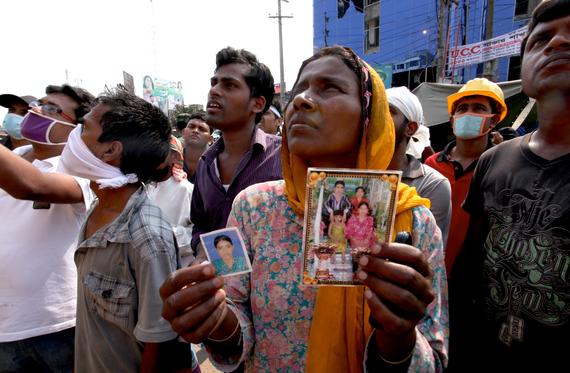Garment manufacturing
19 March, 2024
The future of due diligence in garment manufacturing
Photo: Awaj FoundationThe need for binding regulations and actions brands can take to promote living wages were key topics at a recent OECD meeting, where stakeholders gathered to discuss responsible due diligence in the garment and footwear sector. Read our analysis.
Since its adoption in 2017, the OECD Due Diligence Guidance for Responsible Supply Chains in the Garment and Footwear Sector (hereafter “the Guidance”) has become accepted as the landmark framework for the sector. But despite some positive developments, the industry continues to grapple with systemic issues - from worker exploitation to environmentally damaging practices - and with the Pandemic and recent economic developments exacerbating existing pressures.
Against this backdrop, representatives of government, business, trade unions, civil society and academia recently met at the OECD premises in Paris to discuss challenges for the garment industry, with focus on how meaningful due diligence work can be a tool for improvement.
Swedwatch, with its long-term engagement in workers’ rights and role in promoting the Guidance, participated in the event. While a vast number of topics were discussed, here are some overarching themes we find likely to shape future due diligence practices.
Need for harmonized and binding regulations – as a baseline
Given limited improvement for workers and despite the development of several frameworks including the Guidance, many speakers expressed their support of binding regulations, like the currently negotiated EU corporate due diligence directive (which since have been passed by the EU Council, however severely watered down). Bärbel Kofler, state secretary of the German Federal Ministry of Economic Cooperation and Development, highlighted the positive effects of the recent German Supply Chain Due Diligence Act as an example of proof that such regulations can be very impactful.
There was a common understanding that binding due diligence regulations should be considered a baseline and need to be complemented with sector agreements and specific laws.
Why should those companies who invest more also pay more? So, I am arguing for mandatory binding legal frameworks. Minimum rules about the basics, don’t use forced labour, allow union rights etc. /Bärbel Kofler
Far from living wages - buyers need to step in
The lack of decent pay, i.e. sufficient for a worker to afford a decent standard of living, was central to many panel sessions. It was pointed out that most producers still struggle to pay minimum wages and that current purchasing practices compel suppliers to take cost-cutting measures at the expense of worker wages and safety. Going forward the enforcement of responsible purchasing practices (including fair payment terms, sustainable costing and collaborative product planning) by brands is therefore central. Long-term cost benefits were also discussed in the context of wages. Decent pay could reduce turnover, lead to higher productivity and a decrease of textile waste, which would benefit all stakeholders.
Adapting due diligence to circular processes
As the demand for recycled materials and processes surges, new high-risk stages and actors are added to supply chains and must be incorporated into companies' due diligence scope. Examples were given from India where used textiles pass several, often informal, waste management companies before reaching their destination and workers involved in sorting and reprocessing materials face hazardous work conditions.
Panellists also highlighted the need for regulations in this area, including the proposed EU Textile Directive for Extended producer responsibility, as well as the need for buyers to engage with suppliers in skills development and cost-sharing related to recycling.
Climate has become a worker's right issue
While many companies' commitments to cutting emissions are long term, climate change is impacting workers and communities here and now. A scientist from ILR Global Labour Institute shared data on the predicted increases in temperatures in key production centers such as Karachi, Colombo and Dhaka, which will lead to unbearable temperatures in garment factories, along with data on economic damage caused by heat waves and flooding.
Suggestions of what companies can do to increase their climate adaption engagement included being flexible on order in terms and conditions, supporting altered work hours and adequate rest and elaborating with cost-sharing models for investment in production facility adaption. Again, the importance of responsible purchasing practices was highlighted. Panelist Kalpona Akter, Executive Director of Founder of BCWS, talked about ways for companies to adress climate adaption, advising them to, simply, consult factory workers' to understand what new climate related work issues they face, and make an plan based on that.More in-depth info on the various topics can be found on the OECD Forum event page, including recordings to some of the sessions.OECD guidelines
The garment and footwear sector is one of the largest consumer goods sectors in the world. The OECD Due Diligence Guidance for Responsible Supply Chains in the Garment and Footwear Sector establishes a common understanding of due diligence in the sector to help companies meet due diligence expectations.OECD Forum side session arranged by Swedwatch: How can public procurement make a change? Watch the recording 👇🏼Side session highlights:
✔️Public authorities across the EU are major textile purchasers
✔️Public procurement can be used as a lever to promote decent work
✔️A revised EU regulatory framework is needed to ensure public procurement promotes positive impacts
✔️Public authorities should include due diligence requirements in contracts – Sweden is leading with good examplesRelated Swedwatch reports
Contact
Sofia Käll, Programme Officer+46 (0)73 223 02 85sofia@swedwatch....

